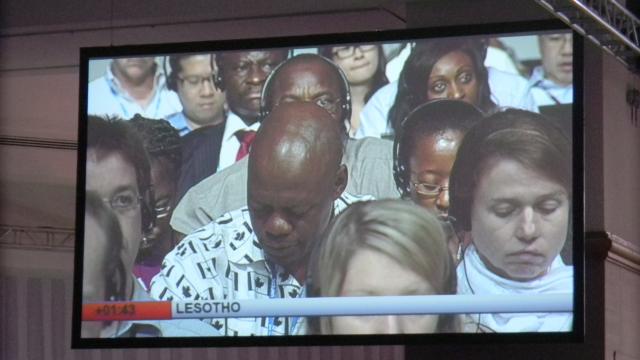A member of the Lesotho delegation at the climate talks in Cancun sports an anti-Canadian shirt (yes, the photo is in color; and yes the little Canadian flags are all black). It’s another illustration that Canada will ultimately pay a price for the irresponsible position that it continues to promote on climate change: do only what has already been done in the United States (nothing, really), but try to do it more slowly.
(Thanks to Eloise Savoie from the Climate Action Network [CAN] for the photo.)
And if you doubt whether Canada deserves this reputation, read on to see an early draft of a CAN fact sheet on Canadian climate performance and policy:
Canada was the only country to return from COP 15 and announce that it was going to weaken its GHG reduction targets. Not that this mattered much, because there is absolutely no evidence that the Prime Minister has a plan to meet his own weak targets.
• Despite Canada’s original commitment to the Kyoto Protocol, Canadian emissions have increased 30% on a 1990 baseline.
•
• Canadians emit 3 times more GHGs per capita than China and Europe.
•
• In November 2010, John Baird became the Minister of the Environment. As Minister of the Environment in 2007, Baird promised Canadians that the government would implement regulations to curb industrial GHG pollution by January 2010, and then proceeded to do nothing.
•
• The only major federal program focused on supporting renewable energy, and the only federal program focused on supporting home energy retrofits, has expired and will likely not be renewed.
•
• The Canadian Foundation for Climate and Atmospheric Sciences, the main funding body for university-based climate research in Canada, is due to run out in 2011 with no indication of renewal.
Prime Minister Harper has not carried out his 2009 G20 summit promise to phase out fossil fuel subsidies. Canadian oil and gas subsidies have reached over $2.5 billion a year.
•
•• Prime Minister Harper muzzled scientists working for Environment Canada, and is now renting out the premier Arctic climate change research vessel to oil companies to promote exploration.
•
•If tar sands development continues at its projected rate, it would produce around 2.2 million tonnes of CO2 per day and more than 800 million tonnes each year until 2025.
•
•• If the province of Alberta (home of the tar sands) were a country, it would have the highest GHG emissions per capita. In 2008, Alberta’s per capita emissions were estimated to be 70 tonnes per person, as compared to 5 tonnes per person in China.
•
•• Harper’s government has used an unelected Senate (and almost unprecedented procedure) to kill climate change legislation that enjoyed the support of a majority of members of Parliament. Bill C-311 was shot down in the Senate on November 16th, just weeks before COP16.
•
•






